“2016 State of American Theology Study,” a survey sponsored by Ligonier Ministries and carried out by LifeWay Research, gives an intriguing and sometimes disturbing overview of what Americans believe. Care was taken to ensure that the 3,000 people who took part in the survey reflected the U.S.’s diverse population.
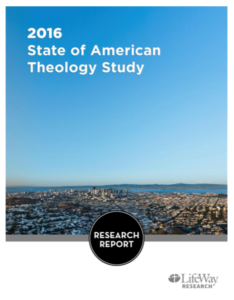 The results of the survey have generated considerable discussion among Protestants. In a recent article in First Things, Matthew Block bemoaned the spread of heretical beliefs among American Evangelicals. He notes that among “Evangelicals” – those who hold to core Evangelical beliefs – 71 percent believed Jesus to be a created being and 56 percent believed the Holy Spirit to be an impersonal force.
The results of the survey have generated considerable discussion among Protestants. In a recent article in First Things, Matthew Block bemoaned the spread of heretical beliefs among American Evangelicals. He notes that among “Evangelicals” – those who hold to core Evangelical beliefs – 71 percent believed Jesus to be a created being and 56 percent believed the Holy Spirit to be an impersonal force.
Mr. Block’s article just scratched the surface of the survey. Other significant findings include: (1) the majority of Americans (60 percent) agree with the statement “Heaven is a place where all people will ultimately be reunited with their loved ones;” (2) 49 percent of Americans agree with the statement “Sex outside of traditional marriage is a sin;” and (3) 77 percent of Americans agree “an individual must contribute his or her own effort for personal salvation.” (See the Research Report pages 3-5) To put it another way, 60 percent of Americans are universalists, almost half do not think fornication to be sin, and more than three quarters believe in salvation by works.
While reading the survey findings it is important to note that two groups were being surveyed: Americans in general and Evangelicals. Thus, it behooves the reader to make sure that the percentages enumerated are applied to the right group. For example, the findings in the previous paragraph pertain to Americans in general, not American Evangelicals in particular. One need not be surprised if a substantial percentage of the American public are said to hold deviant beliefs; however, it should be a matter of concern if a similar percentage of Evangelicals hold deviant beliefs. For example, in the section “Ethics” (Statement No. 39) it was found that only 52 percent of self-identified Evangelicals agreed with the statement that sex outside of traditional marriage is a sin – a startling shift away from historic Christian morality.
On the other hand, in another section (Statement No. 18) it was found that the more often one attends church the more likely one is to disagree with the statement that one can contribute to one’s salvation through good works – affirming salvation by grace alone, through faith alone which are core Protestant beliefs. It should be noted that the graphics are not accompanied by percentages. For scrupulous researchers this is quite frustrating.
Some Caveats
Readers who wish to examine the survey research and analysis are advised to visit the following sites: (1) the 26 page Research Report (White Paper) which summarizes the findings (2) the 103-slide PowerPoint presentation of survey results, (3) Bob Smietana’s easy-to-read overview, and (4) Ligonier Ministries’ analysis.
I found the survey very informative but noticed one important omission, the religious identity of the respondents. In the latter half of the PowerPoint presentation, the responses were broken by region, ethnicity, economic status, and age, but not by religious affiliation. It would be helpful to know how Evangelicals stand in relation to liberal mainline Protestants, Roman Catholics, Mormons and Jehovah Witnesses, and secularists. This kind of demographics profile would help make sense of the data especially as America becomes increasingly pluralistic with the rise of the so-called “Nones” and the growth of the non-Christian population.
Another matter of concern is the confusing manner in which numbers are presented. The Research Report finds that 95 percent of Evangelicals affirm the statement: “The Bible alone is the written word of God.” In contrast, only 42 percent of the general American population believe that. However, I find this puzzling because when I add 33 percent of “strongly agree” with 19 percent for “agree somewhat” I get 52 percent. The inconsistent numbers presented raise questions about the validity of the survey.
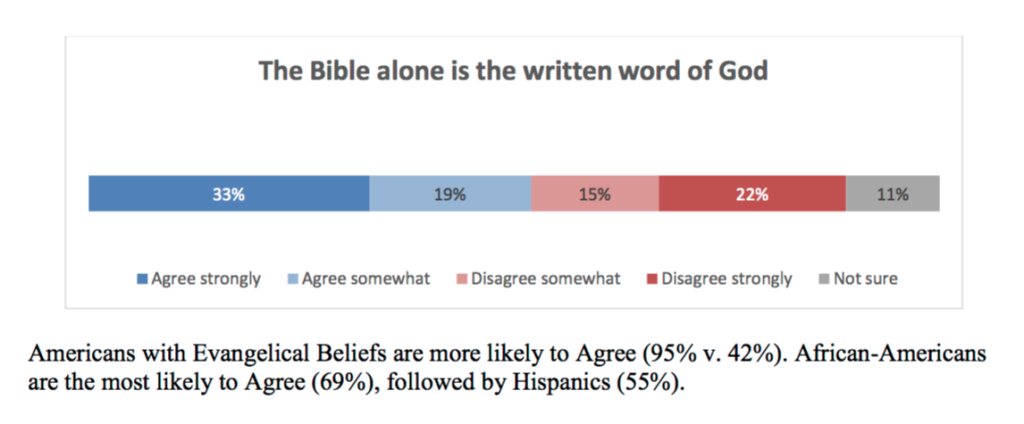
p. 15 Link
Evangelicalism Falling Apart?
As a Protestant convert to the Orthodox Church, I found the responses on how Evangelicals understand the church striking. The responses suggest that American Evangelicalism, at least in its corporate expression, is falling to pieces – becoming increasingly fragmented doctrinally and ecclesially.
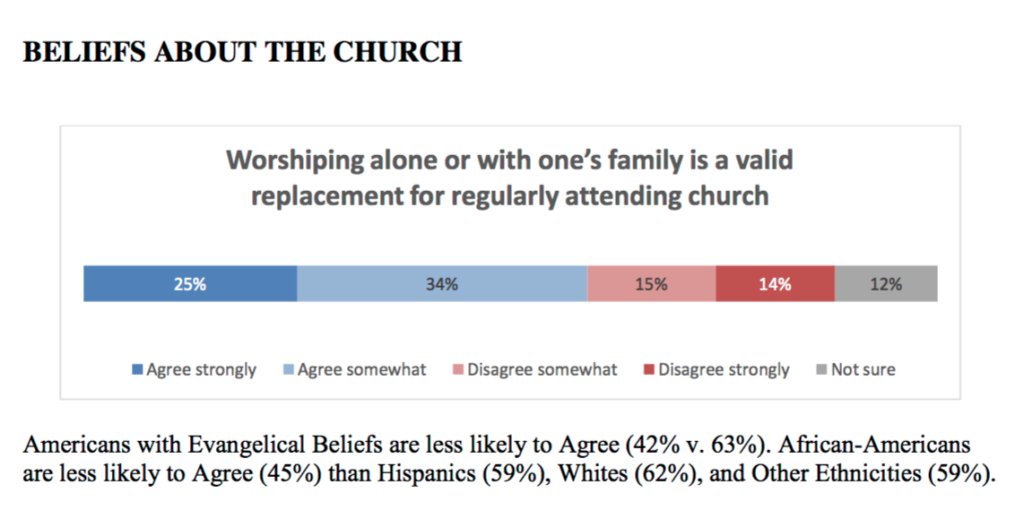
p. 19 Link
In response to the question: “Worshiping alone or with one’s family is a valid replacement for regularly attending church,” some 59 percent of Americans agreed, while 29 percent disagreed. In the caption underneath the graphic, LifeWay noted that Evangelicals were less likely to agree, giving the percentages of 42 percent versus 63 percent. First, even if 42 percent of Evangelicals agree that’s still quite a high percentage that has abandoned the traditional view of the Church. Second, I have no idea what the number 63 percent refers to. I don’t think it refers to those who agree versus those who disagree because the total should come close to 100 percent, not the 105 that results from adding 42 to 63. This is where the LifeWay survey falls short. Greater precision is needed in the presentation of the findings in order for readers to benefit from the research project.
This devaluing of church membership seems to support the rise of the “Nones” and the “Dones.” See Mark Sandlin’s article “The Rise of ‘The Dones’ as the Church Kills Spiritual Community” in which he attempts to explain how the current dysfunction in Evangelical churches is alienating and driving away committed people. In his explanation of the emergence of the “Dones” – unaffiliated believers, Mr. Sandlin writes:
The Church is killing spiritual community or at least killing it in an ever-growing portion of our population. The Dones’ experience with the Church killed their desire to ever go to that place of spiritual relationship in community again.
He elaborates:
The Dones are right. The communities making up far too many churches are much more soul sapping than they are spiritually nurturing.
This growing disenchantment with church life, while quite different from doctrinal orthodoxy, ought to be of concern to Christians. Christianity’s future in America depends not just on right doctrine but also on life in community.
What really caught my attention were the responses to the question: “My local church has the authority to withhold the Lord’s Supper from me and exclude me from the fellowship of the church.” Some 45 percent of Christians who attended church on holidays or more frequently “disagreed strongly,” while another 17 percent “disagreed somewhat.” Those who agreed, strongly or somewhat, comprised only 29 percent. It seems that Evangelicalism’s emphasis on a personal relationship with Christ has taken on more extreme forms, with many unwilling to accept the authority of the Church.
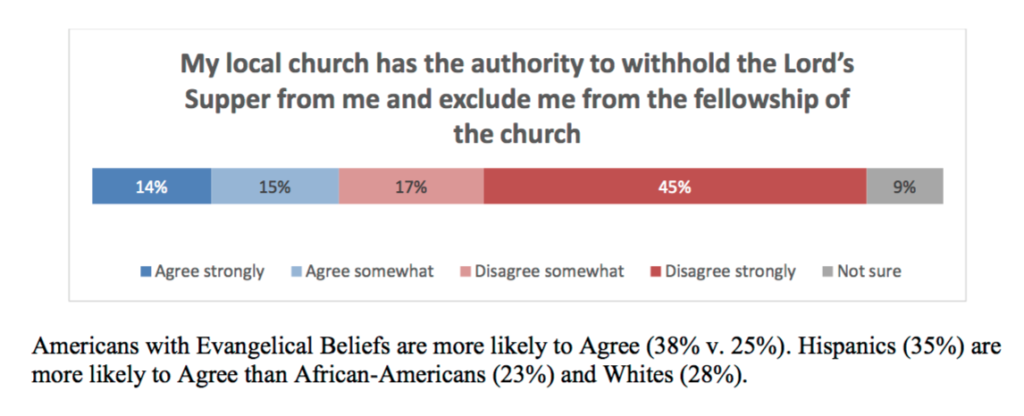
p. 20 Link
This is contrary to the historic Protestant understanding of the three marks of the Church: the pure preaching of the Word, the pure administration of the sacraments, and church discipline (See Belgic Confession, Article 29). What is concerning about this rejection of church discipline is that it constitutes a rejection of the Church as the Mother of the faithful. It may surprise Evangelicals to learn that John Calvin believed this. Calvin wrote:
“For what God has joined together, it is not lawful to put asunder,” so that, for those to whom he is Father the church may also be Mother. (Institutes 4.1.1)
Calvin’s high view of the Protestant (Reformed) Church, reflects his qualified view of the Ancient Church. (Calvin alternately praised and scorned the the early Church Fathers — depending on whether they were in agreement with him.) Cyprian of Carthage, a third century Church Father wrote:
He can no longer have God for his Father, who has not the Church for his mother. (On the Unity of the Church §6)
The implication here is that in dispensing with Christian life in the visible Church — whether Protestant, Roman Catholic, or Orthodox — Evangelicalism has become doubly estranged from its historic Christian roots: both in the Reformation and the early Church. As Evangelicalism, especially its Anabaptist variants, take on more extreme positions, it becomes a religion that neither the early Reformers nor the early Church Fathers would recognize as Christian.
Scripture and Creeds
One surprising finding is the positive regard Americans have towards creeds. There was a largely negative response, 58 percent, to the statement: “There is little value in studying or reciting historical Christian creeds and confessions.” This suggests an openness to using historic creeds or doctrinal statements to offset the emphasis on private interpretations of Scripture.
The next question then becomes which creed ought to be used? Each Protestant denomination has its own creed or confessions. For example, a Lutheran might tout the Augsburg Confession (1530), a Reformed Christian the Westminster Catechism (1646), and the Anglican the Thirty-Nine Articles (1563; see Note 1). For those interested in the early Church there are the Apostles Creed and the Nicene Creed.
Sola Scriptura?
The authority of Scripture cannot be understood apart from the interpretation of Scripture. It was found that half of the American population (51 percent) believes that “the Bible was written for each person to interpret as he or she chooses.” The Research Report (p. 14) noted that only 30 percent of Evangelicals agreed with this. That as many as a third of Evangelicals hold this view, (as opposed to half of the American public) while positive, should still be a matter of concern. Augustine of Hippo wrote:
If you believe what you like in the Gospel, and reject what you don’t like, it is not the Gospel you believe, but yourself.
Augustine here was warning against private interpretation of Scriputre. It is curious then that so many Protestants love this quote as IF Augustine agrees with their own doctrines and view or the gospel! This is simply not true. As a fourth-century Bishop of the Church, Augustine held firmly to an episcopal form of church government – the local church under the rule of the bishop. This is in sharp contrast to the presbyterian and congregational polity favored by modern Protestants. Augustine believed in authoritative Apostolic Tradition, the real presence of Christ’s body and blood in the Eucharist, baptismal regeneration, the sacrament penance, Mary’s perpetual virginity, the possibility of falling from grace, prayer to the saints and praying or the departed — all common practices of the ancient historic Church but which have been rejected and vilified by many of today’s Protestants and Evangelicals. See Joe Wilcoxson’s “Was St. Augustine a Protestant?” This narcissistic private reading of Augustine and the consequent distorted understanding of church history is tragic to say the least.
Much of the independent reading of Scripture can be traced to low-church Evangelicalism. As a remedy to this Matthew Block prescribes high-church Protestantism. Where popular Evangelicalism favors solo scriptura — reading the Bible independently of outside sources, historic Protestantism favors sola scriptura — reading Scripture with the creeds and in the larger Church (See Note 2). Mr. Block writes:
If we are going to address the rise of heresy in our churches, then Christians must rededicate themselves to reading the Bible in community—with the local church, yes, but also with the Church throughout history. If the Bible is truly the authority Evangelicals say it is, then we must also recognize that God has exercised that authority over Christians other than ourselves. The history of the Church, in its creeds and confessions, is a witness to other Christians who have been shaped by and wrestled with the Word of God. (Source)
However, Matthew Block fails to explain why Lutheranism, especially his brand of Lutheranism, offers the best remedy for the ills uncovered by the LifeWay survey. For all its affirming the authority of Scripture, Protestantism has historically suffered from fragmentation, in terms of doctrine, worship, and polity. Ultimately, Protestantism’s denominationalism is rooted in the private reading of Scripture implicit in sola scriptura. For example, one who joins a Lutheran church is following Martin Luther’s reading of Scripture. With the proliferation of mega-churches and many smaller community churches private interpretation of Scripture has become pervasive among Protestant churches today. Wheaton College Professor of Theology, Beth Felker Jones, attributes the doctrinal confusion to the rise of pastor-centered churches:
I fear that we’re spending too much time in cults of personality around charismatic superstar pastors, who often focus more on their personal theological idiosyncrasies and pet ideas than on basic Christian orthodoxy. (Source)
Much of Matthew Block’s prescription for the ills of Evangelicalism is sound but does not go far enough. He prescribes the classical Protestantism of the 1500s but an alternative is Ancient Christianity of the first millennium, e.g., the Seven Ecumenical Councils and the Church Fathers.
What the best of Protestant pastors must confess is this: Luther’s appeal to his own views can easily become the appeal of all sincere Protestants — who can appeal like Luther did to his own conscience and take his own stand even if it differs from Luther’s. Protestantism is full of little Luther’s taking their own stand for biblical truth giving rise to denominational differences that trouble Protestants who desire a visible unity for the Church.
Implications for the Future of Protestantism
The LifeWay survey poses significant challenges for Rev. Peter Leithart recent First Things article, “Is There a Future for Protestantism?” In this article Rev. Leithart approaches Protestantism doctrinally and sociologically. He asserts that as a sociological entity Protestantism does indeed have a future. He optimistically sketches a future where non-liturgical churches will adopt liturgies, non-sacramental churches will start having weekly Eucharist, and become more open to the rich heritage of historic ancient and medieval Christianity. The problem is that Rev. Leithart fails to present empirical evidence to support his claims. If anything, the evidence presented in the LifeWay survey and the analysis by Ligonier Ministries point to the spread of deviant doctrines and a growing disregard for church discipline and common worship on Sunday mornings. What we see here is more wishful thinking than facts-based realism.
Safe Harbor
Unlike Protestantism, which has been marked by denominational fragmentation, and even more disturbing, the inability to provide doctrinal and liturgical stability, Orthodoxy is marked by a stability that has endured for two millennia. Protestants tired of constantly changing doctrines might want to seek shelter in the Orthodox Church. The words of John Chrysostom, the fourth-century church father, still resonate today:
Just as a calm and sheltered harbour provides great security to the ships moored there, so does the temple of God: when people enter it, it snatches them away from worldly affairs as from a storm, and gives them the capacity to stand and listen to God’s words in calm and security.
This place [the Church] is the bedrock of virtue and the school of spiritual life…
You need only set foot on the threshold of a church and at once you are liberated from the cares of daily life. (Source)
More Reforms Needed?
It is regrettable that Rev. Leithart insists on rejecting Orthodoxy and its ancient patrimony of ancient liturgies, Church Fathers, Desert Fathers, Ecumenical Councils, and bishops who can trace their lineage back to the original Apostles. He calls for even more reforms for Protestant churches, but who knows where it will take them? Already much of what passes for “Protestant” churches today would be unrecognizable and abhorrent to the original Protestant Reformers. Those troubled by the predicaments and quandaries of Protestantism should heed the words of the prophet Jeremiah:
This is what the Lord says:
“Stand at the crossroads and look;
Ask for the ancient paths,
Ask where the good way is, and walk in it,
And you will find rest for your souls.”
(Jeremiah 6:16 NIV; emphasis added)
Robert Arakaki
Note 1: Some Anglicans might dispute that the Thirty Nine Articles are a creed, pointing out that Anglican rely on the Apostles Creed, the Nicene Creed, and Athanasian Creed. However, the fact that several sources refer to the Thirty Nine Articles as a “doctrinal statement” indicates that it delineates the distinctiveness of Anglican identity in a way that the three aforementioned creeds do not.
Note 2: Keith Mathison coined the phrase solo scriptura to highlight modern Evangelicalism’s divergence from historic Protestantism’s sola scriptura. See my review of Prof. Mathison’s The Shape of Sola Scriptura.
Articles
“Is There a Future for Protestantism?” by Rev. Peter Leithart. First Things 13 October 2016.
“Survey Finds Most Americans Are Actually Heretics” by G. Shane Morris. The Federalist 10 October 2016.
“Evangelicals, Heresy, and Scripture Alone” by Matthew Block. First Things, 4 October 2016.
“Evangelicals’ Favorite Heresies Revisited by Researchers.” by Caleb Lindgren. Christianity Today 28 September 2016.
“Americans Love God and the Bible, Are Fuzzy on the Details” by Bob Smietana. LifeWay-Research, 27 September 2016.
“An Orthodox Remedy for Evangelicalism’s Heresy Epidemic” by Robert Arakaki. OrthodoxBridge, 11 January 2015.
References
2016 State of American Theology Study – Research Report by LifeWay Research.
PowerPoint Presentation by LifeWay Research.
State of Theology: Key Findings by Ligonier Ministries.
Orthodox Resources
A Pocket History for Orthodox Christians by Father Aidan Keller.
An Online Orthodox Catechism by Bishop Alfeyev Hilarion.

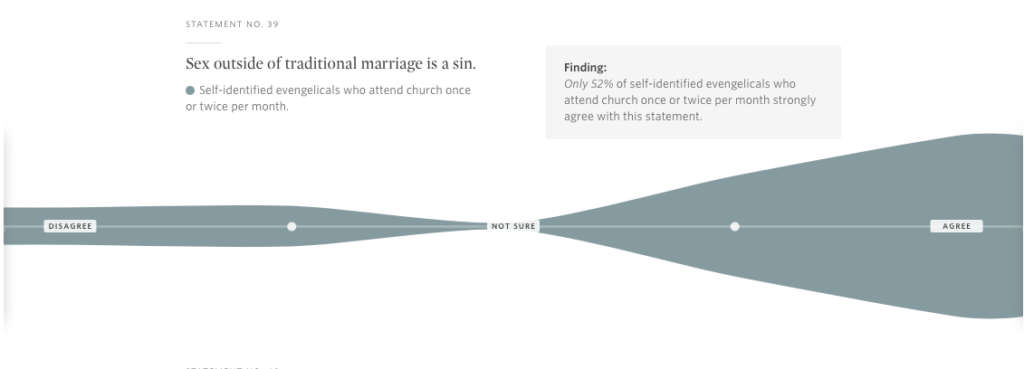
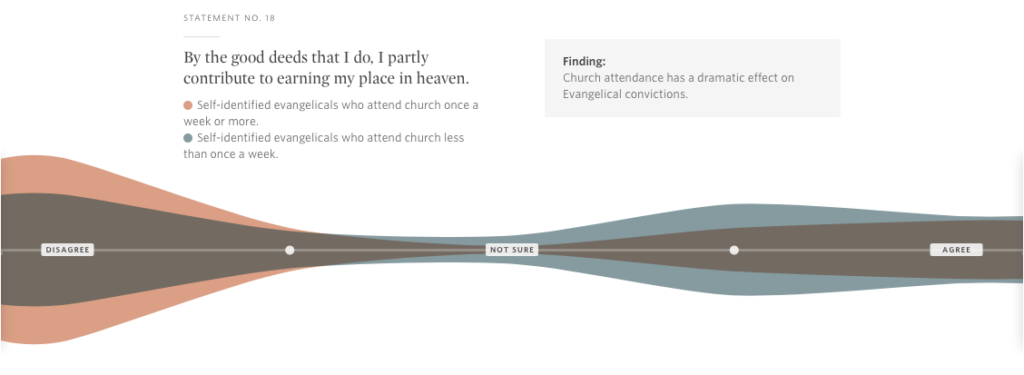
Sadly, much of this can be equally applied to Roman Catholicism, which is also facing a “falling to pieces” of epic proportions. As I’ve always been told, Roman Catholicism and Protestantism are flip sides of the same error(s). It is interesting how it’s taken 500 or more years for these trees to finally bear their true fruit for all to see (Matthew 7:15-20).
Hmmmm….it is always fascinating to see these articles but they seriously understate the real and serious problems Orthodoxy has. Many of these are the same issues outlined in this survey. So when can we get serious about these issues in the Orthodox Church instead of just pretending that everything is good if we just roll the clock back to ancient Byzantium?
Andrew,
If one wishes to compare Orthodoxy against Protestantism, a lot depends on how one goes about it. One could take as a starting point the externals of “successful” churches with packed services and an abundance of ministry groups, or one could begin with internal matters like faith and worship. As a former Protestant I enjoyed the best of what Protestantism has to offer. What drew me to Orthodoxy was the fact that Protestantism is underneath the surface deeply divided along the lines of doctrine and worship. Unless I wanted to become a relativist with respect to theology, I needed to find the eternal truth of the Christian Faith. I did not leave Protestantism because I was unhappy with it as I became convinced that Orthodoxy has kept the Apostolic Faith for two thousand years. My studies in church history led me to conclude that much of Protestantism’s distinctive features are innovations that deviate from the historic Christian Faith. As one who attends an ethnic Orthodox parish I am well aware of the shortcomings of real-life Orthodoxy but even in a typical Orthodox parish one will find the same Faith held by the Church Fathers of the early Church. I have noted from time to time that there is a need for Orthodoxy in America to be less ethnocentric and more outreach oriented. And, I will agree that there is a need for better preaching in the Liturgy and clergy who are well-versed in Scripture. As a Protestant who converted to Orthodoxy I no longer have to worry about the ground shifting under me every so often. I no longer worry about my pastor embracing the latest fad or presenting a new teaching from the pulpit. In short, in the Orthodox Church I found “safe harbour.”
With respect to your last point about rolling the clock back to ancient Byzantium, you seem to have a modern progressive approach to theology, i.e., that theology must evolve over time and keep up with culture. Christianity is based on the understanding that Truth is eternal and does not change with the flow of history. The Great Commission passage in Matthew 28:19-20 assumes that the Gospel preached in the first century will be same in the twenty-first century. Orthodoxy is not grounded in Byzantium as it is based in the Church Catholic which manifest in the Church Fathers and the Ecumenical Councils.
Robert
The two creeds we use most frequently in our church are the apostles and the Nicene creed. Things like the Westminster creed or the cannons of Dort are rarely if ever referenced or used. In answering the question “It was found that half of the American population (51 percent) believes that “the Bible was written for each person to interpret as he or she chooses.” probably I would answer yes but that is not the whole story. For example I reject the filoque because I can not demonstrate it from scripture and because it was not in the original and because the E-Orthodox reject it. I may stray from what our catechisms say but in no case that I can think of do I adopt something totally outside of that held by some major group within Christendom. In a number of other places I adopt Orthodox understandings eg Theosis and “I was saved, I am being saved and I will be saved.”. Surverys can be hard to construct so that they give the answers you think you will get.
Dawit,
As a social scientist I would have to take issue with your closing statement that “surveys give the answers you think you will get.” Surveys like the recent LifeWay survey are limited in their usefulness, but they are helpful to an extent. The key is to keep in mind their limitations. They are like a snapshot at a particular angle of a complex phenomenon taken at a certain time. I appreciate the hard work that LifeWay Research did even as I challenged certain aspects of their findings. My advice to you and other readers is that you all examine the data and the methodology employed by LifeWay and then to interact with the research. Without efforts by LifeWay and the generosity of Ligonier Ministries in sponsoring the research we would be reduced to relying on anecdotal evidence which can be very subjective and biased.
Your comment about the Westminster Confession and the Canons of Dort not being referenced in Reformed churches today underscores my concern that Protestant Christianity has become unmoored from its historical roots and is drifting with the flow of contemporary culture. I found that Orthodoxy continues to be rooted in the Church Fathers and Ecumenical Councils. Far from being regarded as quaint relics, they comprise a living reality that informs the Orthodox Church. As a church history major I find myself delighted with knowing that I am now part of the Church that has organic ties with the Ancient Church.
Robert
I agree with you that some Protestants seem to be moving away from Christian light.
But since you think that we need to pay more attention to the doctrinal statements of the Reformation like Westminster and Dort then I would assume that you heartily approve of the new Calvinists like Piper and Sproul?
If I were a Protestant, I would be likely be supporting the New Calvinists. But I’ve since come to the conclusion that Protestantism is fundamentally flawed and that Protestants will find a stable foundation in Orthodoxy.
Robert
OK Now a lot of things make sense.
How did you go from being a monergist to being a synergist? Don’t recall you posting on that subject. One of the many issues I see with Eastern Orthodoxy is a tendency to make way too much into dogma as opposed to doctrine or opinion. But never the less I learn profitable lessons from the Orthodox where as little or nothing from the Roman church.
Dawit,
As you are probably well aware, the Reformed tradition is internally diverse. When I was an Evangelical in the United Church of Christ (UCC), I initially identified with New England Congregationalism then I shifted over to the Mercersburg Theology of the E&R branch of the UCC. I explained in some earlier articles how Mercersburg’s emphasis on Calvin’s Eucharistic and patristic roots prepared me for Orthodoxy. So while I was a monergist, I was not a hard core monergist. Things might have been different, if I had belonged to a conservative Presbyterian church that stressed double predestination.
I’m curious as to what you consider to be the distinctive emphasis of your Reformed tradition. Is it double predestination or is it something else?
I am glad you found your interactions with Orthodoxy beneficial. And, thank you for taking part in the dialogue here.
Robert
Even if I was still a Calvinist, I would not be a fan of Piper and (certainly not) Sproul, for reasons outlined in this article. Those two run INDEPENDENT churches, where they are their own authority.
Hi Robert,
The Orthodox Church is full of sinners. People who claim to be Orthodox get up to all sorts of nefarious activities. In Greece, for example, the prisons are full of murders, rapists and thieves who grew up ‘Orthodox’.
However, when I discuss social issues like homosexuality, or abortion, or sex outside marriage I don’t get nominal Orthodox claiming they what they are doing is Biblical or that the Church does mind.
With Protestantism the ethical solidarity has been broken because some people can revise the meaning of the Bible to suit their own ethical agendas. How many times have I heard that Jesus did not denounce homosexuality and that Paul’s comments have been misunderstood. And I’m not just talking about liberal churches. The involvement of many conservative American Churches with politics is also problematic.
Take for example the issue of alcohol. Protestants are split if alcohol is Biblical or not. I always have a giggle at those churches that still use grape juice in their Eucharist. The backing of prohibition by Evangelicals in the 1930s (over the many other injustices in American society at the time) discredited the idea that morality is unchanging. What you have now are moral relativism where one ethic can go ‘out of date’ and be replaced by a more modern (better?) one.
America is a Christian society so your statistics are alarming. It also raises the alarming issue that modern Protestantism has separated faith from morality (after all it is faith alone). How you act is very different from what you believe. This has spilled over to Roman Catholicism and Orthodoxy. The Church Fathers would have been dumbfounded by this development.
Hi, Stefano:
In reference to the last paragraph of your post above, I’m lead to believe that John Calvin was the first to separate faith from morality, although in his mind he probably didn’t see himself as doing this. In his teachings on predestination, particularly on the perseverance of the saints, he taught that, if one were truly one of God’s predestined to eternal glory, no matter how one lived on earth, be it a holy or an outright sinful life, one was guaranteed heaven. At the same time, one can see where many would arrive at the conclusion that, whether one struggles to live a moral and God-pleasing life based on faith (James 2:20-26) or just live the way one wants anyway, there is no point to struggling; God has foreordained everything. Believe it or not, this “doctrine” of salvation is still considered to be “biblical” and a hallmark of authentic Christianity; granted, not all forms of Protestantism accept this either. With that in mind, one can also understand how such a doctrine has lead to a sense of pious despair among orthodox Calvinists. I also think it’s important to never underestimate Calvinism’s profound impact on American Protestantism in general and in particular how it’s shaped present reality of Protestantism as we know it today.
Hi Puppyman (Medieval or Otherwise),
The way I understand it is that Calvin expected the high moral behaviour (and the work ethic, of course) of his new Reformed Christians to be a sign of their election. Calvin set high moral standards in Geneva. Of course, the behaviour of Reformed Christians never distinguished them from other Christians so it led to a crisis in distinguishing who were and weren’t the elect. It was only then that the role of morality and behaviour was marginalised. I’m not sure when this happened, however. Sometime towards the end of Calvin’s life?
Does this sound right? Please correct me if I am mistaken!
No, I think that sounds about right. Calvin’s standards can be argued to be ridiculously higher than those that the Holy Apostles placed upon their successors, the Bishops. Calvin, despite his rejection of Rome as an historically Orthodox and Apostolic Church (now no longer Orthodox), was as scholastic and rationalist as the “papists” he so heartily abhorred. He didn’t teach morality but moralism; i.e., puritanicalism, a life that is lived in pious despair hoping against hope that God didn’t predestine you to eternal perdition. Calvin, in my estimation, was self-deluded and perhaps one of the saddest human beings in the history of heretical religiosity.
It can only be expected.
From my experience and observations. This was always going to be the result of the Protestant philosophy and as far as i can tell, logically, it will only get worse until the philosophy has completely disolved the Christianity that it attempted to correct from Rome.
You can only do so much when you’re trying to re-create Christianity in your own image and according to your likeness.
Robert, Thank you! This is outstanding.
“The Dones are right. The communities making up far too many churches are much more soul sapping than they are spiritually nurturing.” A thousand times yes to this statement. This happened to me at my last Evangelical church and it was instrumental in setting me on the path towards Orthodoxy.
“I fear that we’re spending too much time in cults of personality around charismatic superstar pastors, who often focus more on their personal theological idiosyncrasies and pet ideas than on basic Christian orthodoxy.” Professor Jones is spot on in this statement. When a church becomes all about the personality of the pastor (and honestly, what Evangelical church these days isn’t that), all that seems to matter is what the pastor says. The view in those types of churches is that everything the pastor says is infallible and trumps everything else. Those become dangerous places that serve as incubators for heretical beliefs.
“It is regrettable that Rev. Leithart insists on rejecting Orthodoxy…..” Yes, for some reason, First Things and Leithart seem to have a real axe to grind when it comes to Orthodoxy.
Orthodoxy is more divided today than ever before due to Ecumenism, Modernism and Globalism. Many unofficial schisms are already in existence. Many no longer attend Holy Liturgy and practice the Faith the way they learned it in their youth. Hurts to admit this.
You have to understand that Lifeway (an arm of the SBC, which is currently undergoing an underhanded Calvinist takeover) and Ligonier are both pushing a revisionist, Calvinist agenda.
The neo-Calvinists are anything but conservative; they want to undo the legacy of the (largely Arminian) Second Great Awakening and revert American evangelicals to a sort of reconstructionist neo-Puritanism, by stealthily taking over institutions and churches. I recommend you read The Wartburg Watch to get a feel for why many rank-and-file evangelicals don’t trust church leaders anymore. The Ligonier/Gospel Coalition folks themselves are to blame.
(By the way, these churches also have an ingrained culture of victim-blaming and rampant sexual abuse owing to their “complementarian” ideology, which frequently comes as a package deal with ESS–Eternal Subordination of the Son. Yes, the neo-Cals are heavily involved in pushing semi-Arianism now. So who are they to be complaining about a lack of sound doctrine?)
Thank you for sharing your thoughts with us.
Robert
Sorry Michael, but I think you are overstating things. Sure tensions are running high between Jerusalem and Antioch.
Constantinople and Moscow don’t see eye to eye on a number of things but, in historic perspective, these are nothing new.
Dare I mention the rivalries between Constantinople, Rome and Alexandria that caused all sorts troubles in the fourth, fifth and sixth centuries.
Sure, things are pretty messed up around the planet but Orthodoxy is still in the struggle. We are the voice crying out in the wilderness!
It is not a surprise that such a survey would have the results reported. As Paul told the Thessalonians,
Let no one deceive you by any means; for that Day will not come unless the falling away comes first, and the man of sin is revealed, the son of perdition, 2 Thessalonians 2:3 (NKJV)
In my own lifetime (I’m 62), I’ve seen a weakening in biblical belief among all Churches. The mainline churches in the US are among the worst and I would no longer accord the Episcopal Church or the United Church of Christ the honor of labeling it Christian. At least one Presbyterian denomination is in the same boat. That we see a lessening of respect for the Church, as such, goes along with this problem. Even the unconverted know something is wrong.
Where popular Evangelicalism favors solo scriptura — reading the Bible independently of outside sources, historic Protestantism favors sola scriptura
This is an interesting claim, one I’ve seen made no where else. The term “Sola Scriptura” means scripture alone. The creeds are irrelevant with such a concept as the creeds are supposedly biblically based and, as such, are unnecessary when taking the word as it is. Taken as it was originally meant, Sola Scriptura would mean what you mean by Solo Scriptura.
Having said that, there is no reason to study how others through history have wrestled with scripture so as to properly apply in their lives. However, the final authority is scripture, whose ultimate author is God, not the Church.
Citing Augustine is something I find a bit amusing in an Eastern Orthodox commentator. I’ve seen him referred to in varying ways by Orthodox writers, from “Blessed Augustine” all the way to calling him a heretic. I agree that Augustine is a mixed bag and is the actual progenitor of Calvinism, which is quite aberrant both in its Soteriology and Theology proper.
When I see surveys like the one referenced in this post, I recall one that was done back in the 80s, IIRC, by Barna. That survey found that a large part of the population of the US regarded itself as “born again.” But, when you get into the rest of the survey, Barna pointed out there was only about 5-6% of the population for whom Christianity was something serious – they lived it day to day. This result is in line with the words of Christ,
Because narrow is the gate and difficult is the way which leads to life, and there are few who find it. Matthew 7:14 (NKJV)
The overwhelming majority of mankind will not enter the Kingdom, regardless of what they think. In most cases, their Christianity is an invention of their own, and not what Christ established. They see God as love, but a love that ignores their sin.
I would agree with those you reference in Note 1 as to the 39 articles not being a creed, at least in the same sense as, say, the Nicene Creed.
So you understand where I am coming from, I am Pentecostal. To make it utterly clear, that is not the same as Charismatic as many think.
Thank you for visiting the OrthodoxBridge and joining the conversation.
With respect to your questioning the distinction between solo scriptura and sola scriptura, I referenced Note 2. In that End Note I cited Keith Mathison’s book “The Shape of Sola Scriptura.” I don’t know how much interaction you have had with Protestants who identify with the magisterial Protestant Reformation but this is an important distinction for them. Keith Mathison’s book is worth reading as it gives a good description of Protestantism’s internal diversity.
As for your finding my citing Augustine of Hippo “a bit amusing,” I would note that Orthodoxy has never officially condemned him. While some Orthodox are highly critical of him, I want to take a more open approach to this great Western theologian. Please keep in mind that with respect to certain issues there is considerable latitude in Orthodoxy — one of them being Augustine’s status as a church father.
I find your claim that you are “Pentecostal,” not “charismatic,” intriguing. What makes one “Pentecostal”? Is it belonging to a denomination? A specific kind of experience? And, how does one distinguish a “Pentecostal” from a “charismatic”? After all, “charismatic” derives from the Greek word “charismata” which means spiritual gifts, among them speaking in tongues.
God bless you in this coming New Year!
Robert